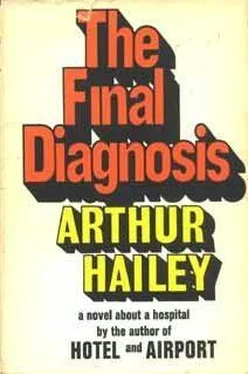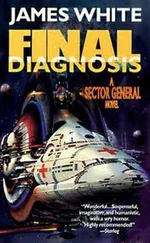Arthur Hailey - The Final Diagnosis
Здесь есть возможность читать онлайн «Arthur Hailey - The Final Diagnosis» весь текст электронной книги совершенно бесплатно (целиком полную версию без сокращений). В некоторых случаях можно слушать аудио, скачать через торрент в формате fb2 и присутствует краткое содержание. Жанр: Триллер, на английском языке. Описание произведения, (предисловие) а так же отзывы посетителей доступны на портале библиотеки ЛибКат.
- Название:The Final Diagnosis
- Автор:
- Жанр:
- Год:неизвестен
- ISBN:нет данных
- Рейтинг книги:4 / 5. Голосов: 1
-
Избранное:Добавить в избранное
- Отзывы:
-
Ваша оценка:
- 80
- 1
- 2
- 3
- 4
- 5
The Final Diagnosis: краткое содержание, описание и аннотация
Предлагаем к чтению аннотацию, описание, краткое содержание или предисловие (зависит от того, что написал сам автор книги «The Final Diagnosis»). Если вы не нашли необходимую информацию о книге — напишите в комментариях, мы постараемся отыскать её.
The Final Diagnosis — читать онлайн бесплатно полную книгу (весь текст) целиком
Ниже представлен текст книги, разбитый по страницам. Система сохранения места последней прочитанной страницы, позволяет с удобством читать онлайн бесплатно книгу «The Final Diagnosis», без необходимости каждый раз заново искать на чём Вы остановились. Поставьте закладку, и сможете в любой момент перейти на страницу, на которой закончили чтение.
Интервал:
Закладка:
O’Donnell beckoned Nurse Penfield. “Come with me, please. I’d like you to help us.”
What happened next was done with swiftness and precision. One moment a middle-aged woman was serving at the cafeteria counter. The next, Mrs. Straughan had taken her arm and had steered her into the diet office at the rear. O’Donnell told the bewildered woman, “One moment, please,” and motioned Nurse Penfield to remain with her.
“Take the food she was serving and incinerate it,” he instructed Mrs. Straughan. “Get back any you can that’s already been served. Remove any dishes she may have touched and boil them.”
The chief dietitian went out to the serving counter. In a few minutes O’Donnell’s instructions had been followed and the cafeteria line was moving once more. Only a few individuals closest to the scene were aware of what had occurred.
In the office at the rear O’Donnell told the woman kitchen worker, “Mrs. Burgess, I must ask you to regard yourself as a patient in the hospital.” He added kindly, “Try not to be alarmed; everything will be explained to you.”
To Nurse Penfield he said, “Take this patient to the isolation ward. She’s to have contact with no one. I’ll call Dr. Chandler and he’ll issue instructions.”
Gently Elaine Penfield led the frightened woman away.
Afterward Mrs. Straughan asked curiously, “What happens to her now, Dr. O.?”
“She’ll be well looked after,” O’Donnell said. “She’ll stay in isolation, and the internists will study her for a while. Sometimes, you know, a typhoid carrier may have an infected gall bladder, and if that’s the case she’ll probably be operated on.” He added, “There’ll be follow-up checks, of course, on all the other people who have been affected. Harvey Chandler will see to that.”
On the diet-office telephone Harry Tomaselli was telling an assistant, “That’s what I said: cancel everything—transfers, discharges other than normal, catered meals, the whole works. And when you’ve done that you can call the admitting office.” The administrator grinned across the desk at O’Donnell. “Tell them that Three Counties Hospital is back in business.”
Tomaselli hung up the phone and accepted the cup of coffee which the chief dietitian had poured him from her private percolator.
“By the way, Mrs. Straughan,” he said, “there hasn’t been time to tell you before, but you’re getting your new dishwashers. The board has approved the expenditure and the contract has been let. I expect the work will begin next week.”
The dietitian nodded; obviously the information was something she had anticipated. Now her mind had moved ahead to other things. “There’s something else I’d like to show you while you’re here, Mr. T. I need my refrigerator enlarged.” She eyed the administrator sternly. “I hope this time it won’t require an epidemic to prove my point.”
The administrator sighed and rose to his feet. He asked O’Donnell, “Do you have any more problems today?”
“Not today,” O’Donnell answered. “Tomorrow, though, there’s one item of business I intend to deal with personally.”
He was thinking of Eustace Swayne.
Twenty-four
David Coleman had not slept well. Through the night his thoughts had kept returning to Three Counties Hospital, its pathology department, and Dr. Joseph Pearson.
None of the events of the past few days had changed in the slightest degree Dr. Pearson’s culpability in the death of the Alexander baby. Whatever his responsibility a week ago, it still remained the same. Nor had Coleman revised his own opinion that pathology at Three Counties was an administrative mess, bogged down by outdated concepts and handicapped by antiquated methods and equipment which should have been shaken loose long since.
And yet, uneasily over the past four days, David Coleman had found his feelings toward Pearson changing and moderating. Why? A week ago he had looked on Pearson as a near-senile incompetent, clinging to power beyond his time. Since then nothing tangible had happened to change that conviction. What reason was there, then, for his own uneasiness about it now?
It was true, of course, that the old man had handled the typhoid outbreak and its aftermath with a decision and competence that was perhaps a good deal better than Coleman could have managed himself. But was that so surprising? After all, experience counted for something; and the situation being what it was, it was understandable that Pearson should want to rise to it well.
But it was his own total view of Pearson that was less clear-cut, less firm. A week ago he had classified the old pathologist—whatever his achievements of the past—among the intellectual “havenots.” Now David Coleman was no longer sure. He suspected that in time to come he would be unsure about a good deal more.
The sleeplessness had brought him early to the hospital, and it was a little after 8 a.m. when he entered the pathology office. Roger McNeil, the resident, was at Pearson’s desk.
“Good morning,” McNeil said. “You’re the first. I guess the others are sleeping in.”
David Coleman asked, “Did we get very far behind—with other work?”
“It isn’t too bad,” McNeil said. “There’s quite a bit of non-urgent stuff, but I kept pace with all the rest.” He added, “Seddons helped a lot. I’ve told him he should stick with pathology instead of going back to surgery.”
Another thought had been troubling Coleman. He asked the resident, “That student nurse—the one who had the amputation. Has the leg been dissected yet?” He was remembering that this was the diagnosis on which Pearson and himself had differed.
“No.” McNeil selected a case file from several on the desk. “Vivian Loburton,” he read out, “that’s the girl’s name. It wasn’t urgent, so I left it. The leg is still in the refrigerator. Do you want to do it yourself?”
“Yes,” Coleman said. “I think I will.”
He took the file and went to the autopsy-room annex. From the morgue refrigerator he obtained the leg and began to remove the gauze wrappings. Exposed, the flesh was cold and white, the blood coagulated where the limb had been severed halfway up the thigh. He felt for the area of tumor and encountered it at once—a hard lumpish mass on the medial side, just below the knee. Taking a knife, he cut down deeply, his interest mounting at what he saw.
The manservant took Kent O’Donnell’s topcoat and hat, hanging them in a closet of the gloomy, lofty hallway. Looking about him, O’Donnell wondered why anyone—wealthy or not—would choose to live in such surroundings. Then he reflected that perhaps to someone like Eustace Swayne the gaunt spaciousness, the beamed and paneled opulence, the walls of cold chiseled stone, conveyed a feudal sense of power, linked through history to older days and places. O’Donnell speculated on what would happen to this house when the old man died. More than likely it would become a museum or an art gallery or perhaps merely stand empty and decay as so many of these places had. The notion that someone else would take it as a home seemed inconceivable. This was a place which, logic said, should close its doors at five until next morning. Then he remembered that within these austere walls Denise must have spent her childhood. He wondered if she had been happy here.
“Mr. Swayne is a little tired today, sir,” the manservant said. “He asked if you would mind if he received you in his bedroom.”
“I don’t mind,” O’Donnell said. It occurred to him that perhaps the bedroom might be an appropriate place for what he had to say. If Eustace Swayne had apoplexy as a result, at least there would be a handy place to lie him down. He followed the manservant up the wide, curved stairway, then down a corridor, their footsteps silenced by deep broadloom. At a heavy, studded door the man tapped lightly and lifted a wrought-iron latch. He ushered O’Donnell into the spacious room beyond.
Читать дальшеИнтервал:
Закладка:
Похожие книги на «The Final Diagnosis»
Представляем Вашему вниманию похожие книги на «The Final Diagnosis» списком для выбора. Мы отобрали схожую по названию и смыслу литературу в надежде предоставить читателям больше вариантов отыскать новые, интересные, ещё непрочитанные произведения.
Обсуждение, отзывы о книге «The Final Diagnosis» и просто собственные мнения читателей. Оставьте ваши комментарии, напишите, что Вы думаете о произведении, его смысле или главных героях. Укажите что конкретно понравилось, а что нет, и почему Вы так считаете.












